- Introduction
- Applications of the Metaverse and Virtual Reality in Language Education
- Creating Realistic Context-Enriched Environments
- Virtual Classrooms in the Metaverse A Revolution in English Language Learning
- Language Education in the Metaverse Learning Beyond Reality
- Virtual Reality and the Transformation of Language Teaching
- Learning Languages with the Metaverse From Classrooms to Real-Life Simulations
- Language Learning in Virtual Worlds A Unique Experience with AR and VR
- The Future of Language Education
- Practicing Languages in Virtual Worlds
- From Virtual Travels to Everyday Conversations
- Learning Languages with One Click
- The Metaverse and Language Education
- The Metaverse and a Future Beyond Traditional Classrooms
- Independent Learning in the Metaverse New Opportunities for Growth and Personal Development
- Interaction and Communication with People Worldwide
- Utilizing Instant Feedback Tools and Progress Assessment
- Access to Diverse and Global Educational Content
- Immersion in Languages and Cultures
- The Benefits of Language Learning with Virtual Reality and the Metaverse
- Experiencing Language Learning in the Metaverse and Its Application in Business
- Conclusion
Introduction
In today’s world, where global communication has gained unprecedented importance, learning new languages has become a cornerstone of individual and professional success. With technological advancements and the emergence of concepts like the Metaverse and Virtual Reality (VR), traditional language education methods are rapidly being replaced by innovative and interactive approaches. The Metaverse, as a dynamic virtual environment, offers an unparalleled opportunity to experience language learning in an engaging, practical, and life-like manner.
Language learning in the Metaverse goes beyond teaching grammar and vocabulary concepts. Learners can practice their skills in real-world scenarios by interacting with native speakers, transforming language learning into a real-life experience. This method not only enhances linguistic abilities but also provides unique opportunities for cultural interaction, boosting social and professional skills.
Given the growing need for effective communication in international businesses, utilizing the Metaverse as an educational tool in trade and commerce has become a rising trend. This article explores how the Metaverse impacts language learning processes and its applications in business, examining how this technology enhances linguistic skills in commercial and global environments.
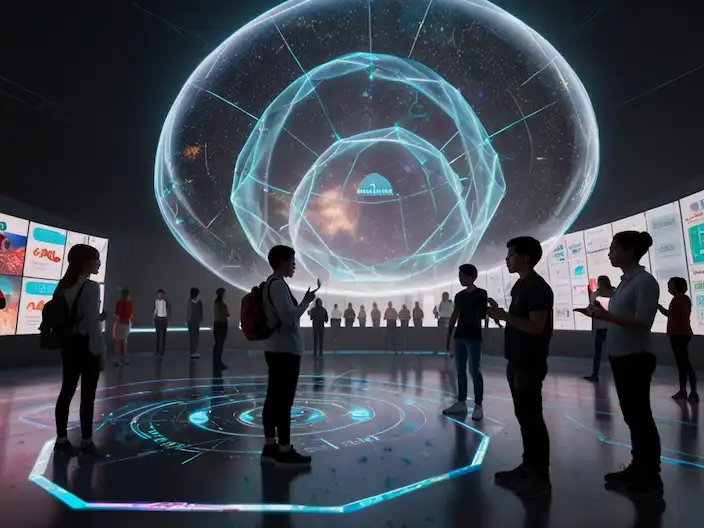
Applications of the Metaverse and Virtual Reality in Language Education
- Creating Realistic, Context-Enriched Environments
One of the standout benefits of learning English in the Metaverse is the opportunity to experience language learning in realistic, context-rich environments. Virtual spaces allow learners to practice language skills in simulated scenarios such as job interviews, business meetings, shopping in stores, or even visiting a doctor. These interactive experiences not only enhance vocabulary and grammar but also significantly improve effective communication in everyday and cultural contexts.
- Virtual Classrooms in the Metaverse, A Revolution in English Language Learning
Virtual classrooms in the Metaverse have fundamentally transformed traditional English language teaching methods. These classes facilitate real-time, dynamic interactions between teachers and learners, turning passive learning into an active and collaborative process. With VR and AR technologies, these classrooms create a sense of physical presence, making distance learning more personalized, engaging, and interactive.
In these environments, learners can easily interact with classmates and teachers, participate in group activities, and receive instant feedback. Additionally, the use of gamified tools and entertaining interactions increases motivation, creating a positive and memorable learning experience.
- Language Education in the Metaverse, Learning Beyond Reality
The Metaverse is rapidly becoming a global platform for language education. This digital space, enriched by VR and AR, offers learners a unique experience. In the Metaverse, they can immerse themselves in environments like cafés, shops, or even business meetings, practicing new languages in practical, real-world settings. This space not only improves language skills but also deepens cultural understanding.
- Virtual Reality and the Transformation of Language Teaching
How Technology Helps Us Learn Languages Better
VR and the Metaverse are redefining language education in entirely new ways. These technologies allow learners to immerse themselves in digital worlds, interacting with others in simulated settings. Instead of reading vocabulary and grammar in textbooks, learners can directly practice their language skills in natural, everyday situations. Using tools like Oculus Quest or other VR headsets, users can converse in different languages, identify mistakes, and utilize instant feedback. This innovative approach turns language learning into an engaging experience while strengthening practical and natural linguistic skills.
- Learning Languages with the Metaverse, From Classrooms to Real-Life Simulations
A unique feature of the Metaverse is its ability to shift language learning from traditional classroom-based settings to real-life simulations. Instead of sitting in classrooms and listening to theoretical lessons, learners can practice new languages in real scenarios, such as shopping in stores or asking for directions on the street. This approach builds learners’ confidence and effectively enhances their skills by exposing them to real-world language challenges.
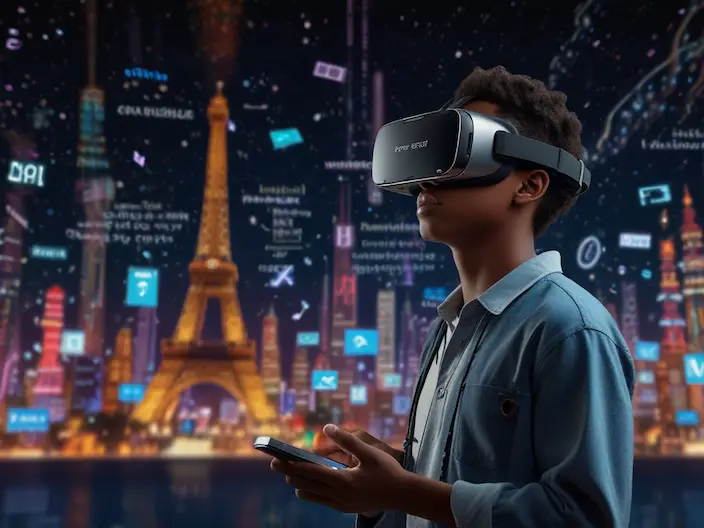
- Language Learning in Virtual Worlds, A Unique Experience with AR and VR
Augmented Reality (AR) and VR combine to take language learning in the Metaverse to new heights. Using AR, learners can interact with different languages in their real-world environments. For example, in AR-supported Metaverse spaces, learners can point at objects and view related vocabulary and information. This approach makes language learning highly interactive and practical. Meanwhile, VR enriches the learning experience by creating fully immersive environments where learners can practice in realistic settings.
- The Future of Language Education
How the Metaverse is Transforming Language Learning
The future of language education is set to change dramatically with the emergence of the Metaverse and related technologies. These platforms can create interactive and realistic experiences, proving far more effective than traditional methods. The Metaverse acts as a powerful tool for developing linguistic and communicative skills by enabling users to interact with native speakers in simulated environments. Moreover, it offers extensive opportunities for personalizing the learning journey according to individual needs and priorities.
- Practicing Languages in Virtual Worlds
Why the Metaverse Has Revolutionized the Learning Experience
One key to the Metaverse’s success in language education lies in its ability to offer learners practical and natural experiences. In virtual worlds, learners can engage interactively with their new language and practice it in realistic scenarios. For instance, they can participate in everyday conversations, shopping, or virtual travel, honing their skills in diverse situations without the stress of traditional exams.
- From Virtual Travels to Everyday Conversations
How the Metaverse is Transforming Language Learning
Through the Metaverse, language learning becomes a full-fledged, engaging experience. Users can easily take virtual trips and seize opportunities to learn languages in various contexts. These trips might include visiting museums, exploring city streets, or participating in cultural events. Such experiences not only strengthen linguistic skills but also enhance cultural understanding and mastery of the target language.
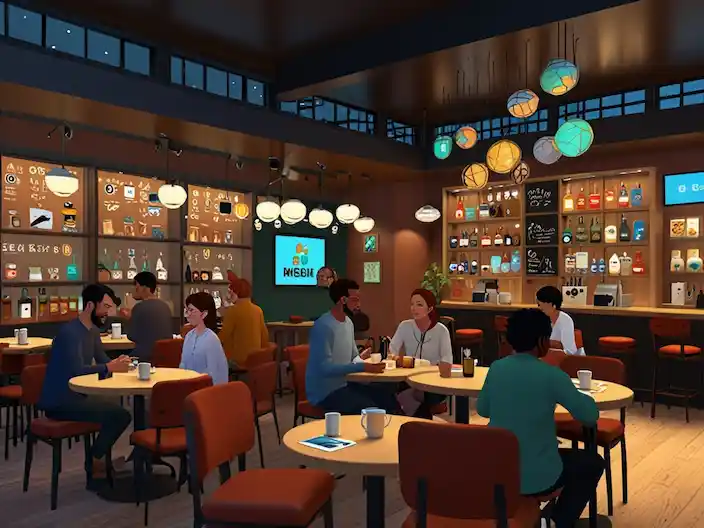
- Learning Languages with One Click
An Exciting Experience in the Metaverse and Virtual Reality
One of the Metaverse’s significant advantages is simplifying and making language learning more accessible. Leveraging VR and AR technologies, learners can enter virtual environments with just one click and gain interactive and engaging language learning experiences. These tools help learners improve their skills in real-time with instant feedback, eliminating the need for physical classroom attendance. This accessibility makes language education more convenient, faster, and enjoyable.
- Metaverse and Language Learning
When Learning Becomes a Real Experience
In the metaverse, language learning transforms into an entirely immersive and interactive experience. This technology provides learners with the opportunity to practice their language skills in real-world scenarios using simulated environments. Instead of merely learning theoretical concepts, they can engage in conversations with native speakers, experience various situations, and test their language abilities in real-life contexts. This approach helps learners fully enhance their skills and achieve fluency in their target language more easily.
- Metaverse Moving Beyond Traditional Classrooms
With the advent of the metaverse, language learning has transcended the boundaries of traditional classrooms. In this space, learners can fully immerse themselves in a virtual world to acquire a new language. This immersion enables them to practice their language skills practically in various scenarios. Moreover, the metaverse allows access to global educational environments and interaction with native speakers, making language learning faster, more effective, and engaging.
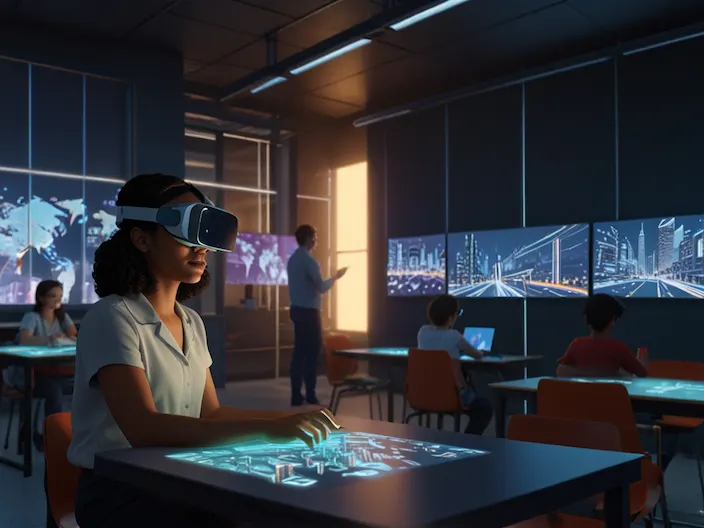
Independent Learning in the Metaverse, New Opportunities for Growth and Personal Development
The metaverse enables users to access a variety of educational resources designed to be interactive and personalized. These tools include virtual classes, chat rooms, online courses, and even daily exercises and challenges that encourage self-directed learning. For instance, language learners can use augmented reality (AR) and virtual reality (VR) technologies to hold new educational sessions in the digital world daily, keeping the learning process fresh and exciting.
- Interaction and Connection with People Worldwide
One of the advantages of self-directed learning in the metaverse is the opportunity for global interactions. This platform allows learners and individuals seeking new skills to easily connect with users worldwide and benefit from their experiences and knowledge. Such interactions are especially valuable for language learning, enabling individuals to engage with native speakers or experts in a virtual environment.
- Utilizing Instant Feedback and Progress Measurement Tools
A common challenge in self-directed learning is the lack of immediate feedback. In the metaverse, this issue is easily resolved. Many educational programs and platforms in this virtual world use artificial intelligence and machine learning technologies to provide instant feedback. For example, language learners can receive precise feedback on pronunciation, grammar, or vocabulary usage immediately after each conversation or exercise, accelerating the learning process and improving skills in less time.
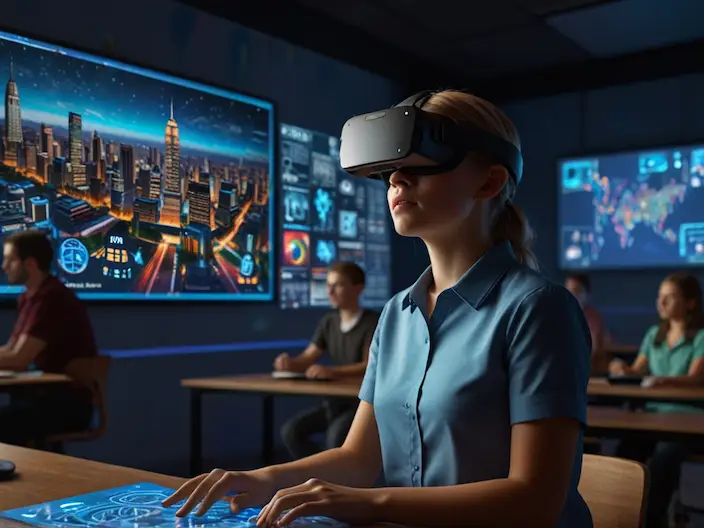
- Access to Diverse and Global Educational Content
The metaverse offers access to various educational resources, including videos, articles, eBooks, and even online courses. Users can explore these resources daily to expand their knowledge. Additionally, these environments are designed to allow individuals to select topics of interest and manage their learning process according to their preferences and needs. This flexibility and freedom make daily self-directed learning in the metaverse highly effective and diverse.
- Immersion in Language and Cultures
One of the greatest advantages of daily self-directed learning in the metaverse is the complete immersion in different languages and cultures. In this virtual world, learners can easily immerse themselves in various cultural environments and learn the language in realistic and practical settings. For example, someone learning Spanish can engage with native speakers in a virtual Mexican environment or use AR programs to interact with cultural and artistic works from Spanish-speaking countries. This approach improves both linguistic and cultural understanding.

The Benefits of Language Learning with Virtual Reality and the Metaverse
Using virtual reality (VR) in language education enables learners to enhance their skills interactively and practically, learning languages more effectively and efficiently. By simulating diverse environments, VR makes language education enjoyable and practical, surpassing traditional learning methods.
Here are some notable benefits of this method:
- Enhanced Interactive Learning
VR enables learners to practice language skills in lifelike scenarios, turning language education into an engaging and practical experience.
- Instant and Accurate Feedback
Speech recognition tools in VR applications provide immediate and precise feedback on pronunciation and language structure, enabling faster and more accurate improvement.
- Realistic Environment Simulation
These applications simulate various environments like restaurants, taxis, or trains, placing learners in real-world scenarios, thereby boosting confidence in using the new language.
- Increased Motivation and Interest
Innovative technologies like VR and AR inspire greater motivation and interest, encouraging continuous learning.
- Cultural Familiarity
Through simulated scenarios, learners not only acquire language skills but also gain insights into the culture and traditions of native speakers, fostering cross-cultural understanding.

Experiencing Language Learning in the Metaverse and Its Application in Business
Language learning in the metaverse offers significant advantages, especially for businesses and organizations aiming to expand their international operations. This experience allows employees and managers to learn new languages in practical, simulated environments where they can practice professional interactions and even engage in business negotiations.
In the metaverse, businesses can organize interactive and personalized training courses that help learners improve their language skills in realistic settings, including negotiations, meetings, and everyday conversations with foreign partners. For instance, managers and employees can participate in simulations of international meetings and practice speaking in the target language, boosting their confidence in business communications and reducing cultural misunderstandings.
This experience also enables businesses to cut down on language training and international travel costs, as employees can attend virtual sessions featuring native speakers and professional simulations without leaving their workplaces. This approach not only enhances language learning efficiency but also fosters international collaborations and strengthens global business relations.
Conclusion
Metaverse and virtual reality technologies are rapidly reshaping language education. By creating interactive and simulated environments, these technologies provide learners with an unparalleled opportunity to enhance their language skills in a unique and practical way. They make the learning process more engaging and enjoyable while offering precise, real-time feedback for faster skill development.
Ultimately, with the continuous development of the metaverse and related technologies, these tools will become an integral part of language education and global communication. With such tools, language learning evolves from a tedious, traditional process into an exciting and practical experience, allowing learners to immerse themselves fully in their target language and culture.
Table of Contents
Toggle
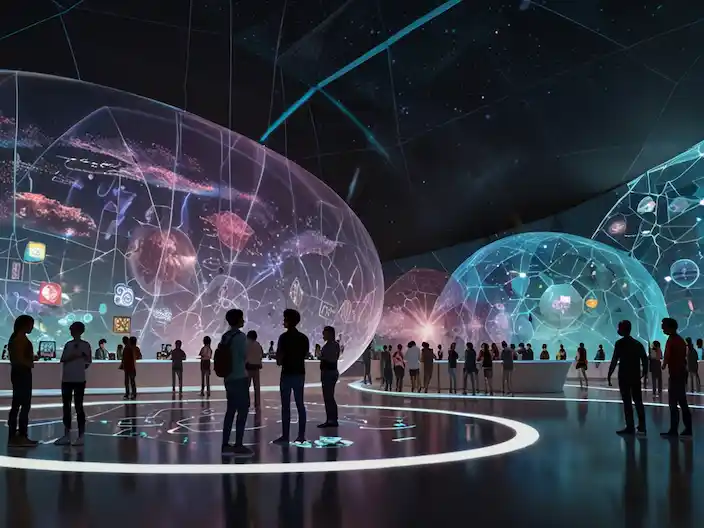

One Response